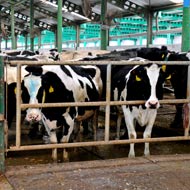New bovine TB campaign revealed

In low risk areas of the country, it is estimated that 50 per cent of new TB breakdowns are caused by purchased animals.
Farming minister George Eustice has unveiled a new campaign to tackle bovine TB, which includes an information hub for farmers and vets, as well as a five point biosecurity plan.
A single website - www.TBhub.co.uk - will now hold all bovine TB advice from the government, leading vets, farming experts and agricultural colleges.
The site covers everything from biosecurity measures to understanding trading rules. It aims to be the 'go to' place for beef and dairy farmers to find information on dealing with TB on their farms.
Mr Eustice also announced a new Bovine TB Biosecurity Five Point Plan, which aims to improve disease prevention on farm and in the trade.
The five points of the plan are:
- Restrict contact between badgers & cattle
- Manage cattle feed and water
- Stop infected cattle entering the herd
- Reduce risk from neighbouring herds
- Minimise infection from cattle manure
In England last year, more than 3,000 farms were affected by new TB breakdowns. Each breakdown is estimated to cost the farmer more than £10,000, and the taxpayer around £20,000. In low risk areas of the country, 50 per cent of breakdowns are said to be caused by purchased animals.
Mr Eustice commented: "There are simple and practical ways for farmers to reduce risk to their herds and neighbouring businesses from bovine TB which are set out in this new action plan approved by vets and farming experts."
By the end of this month, posters featuring the five-point plan will be on display in vet surgeries, cattle auction marts and the offices of the Animal and Plant Health Agency.
Copies will also be sent out to farmers around the country and regular surveys will be carried out to track progress.



 The RCVS has announced a new version of its 1CPD mobile app, with enhanced features for veterinary surgeons and veterinary nurses to record their continuing professional development.
The RCVS has announced a new version of its 1CPD mobile app, with enhanced features for veterinary surgeons and veterinary nurses to record their continuing professional development.